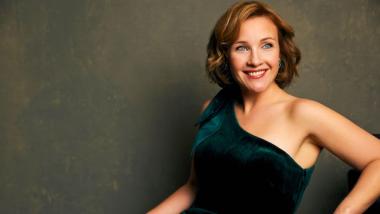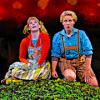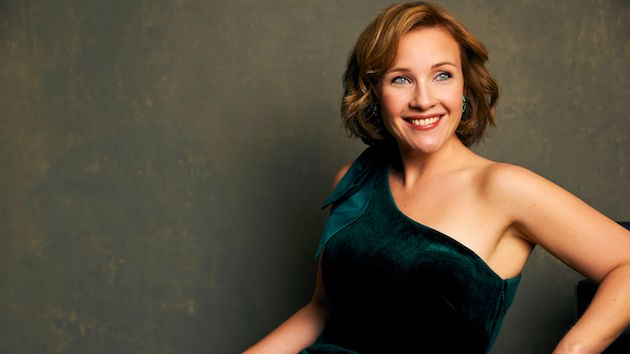
Someone once described the voice of mezzo-soprano Frederica von Stade as having a teardrop in the sound. There are such voices, those that possess something above and beyond beautiful sound. Speaking of another mezzo, conductor Michael Tilson Thomas describes the phenomenon this way: “Every once in a while in classical music, there come along singers who have a quality of singing so beautifully, and touchingly, that it kind of makes you cry, just the sound of their voice. I think Sasha Cooke is one of those people.”
MTT has been an important mentor to Cooke, who will be Artist in Residence at San Francisco Symphony for the 2019–2020 season and returns to San Francisco Opera to sing the title role of Orlando this June. Cooke first moved into the fast lane in 2008, stepping into the role of Kitty Oppenheimer in John Adams’s Doctor Atomic, which was part of the Metropolitan Opera Live in HD series. At that time, another luminary weighed in with high praise. “I have the same feeling about Sasha Cooke as I do about Dudamel,” wrote composer John Adams in a letter to the Met, reassuring them about the use of this relative unknown in such a pivotal role. “I know she’s young,” he wrote, “but sometimes the young people take you entirely by surprise, and I have that feeling about her.”
Now in her mid-30s, Cooke has more than justified such confidence. After Juilliard, Cooke completed one prestigious apprenticeship after another, from Aspen to Wolf Trap to the Met, quickly becoming in demand with opera companies and orchestras. Already, she has sung with over 50 orchestras and more than a dozen world-class opera companies.
Cooke ascribes much of her success to the support of others. “You don’t get where you’re going just by being good,” she says. “There are generous people on the way, who nurture what you have.” Of MTT she says, “We’d be in rehearsal, and he’d say, ‘Sasha, we’re entirely with you. We’ll do whatever you want.’ He basically said, ‘it’s yours.’ He made it very clear that he believed in me. Also, Michael has chosen pieces particularly for me. Or he’ll even say, ‘what do you want to do?’ Usually as a singer, you’re a puzzle piece. They need an alto for Carmina Burana. It’s not really artist-based, unless it’s a Renée Fleming concert. So here’s a case where San Francisco Symphony says ‘we want you to be part of our family, we want you to be here every year, the musicians love you.’ That’s the greatest gift ever.”
Cooke’s gratitude is to her credit, but her level of success is clearly earned. To look at the number of engagements, one would think Cooke must spend half her time reprising roles, but the diversity of her repertory is extensive. This past season has found her singing contemporary works, Baroque works, and everything in between, with symphonies in Chicago, St. Louis, Atlanta, Sioux City, Cleveland, and Washington, D.C., as well as singing the roles of Hansel with Los Angeles Opera, and Eduige in Handel’s Rodelinda in Barcelona, all before arriving here to tackle Orlando. By the time she returns here in the fall to don trousers again for Hansel, she will have sung Mahler and Berlioz in her home state of Texas, Ravel in the Netherlands, Mason Bates in Sun Valley, and a solo recital at London’s Wigmore Hall.
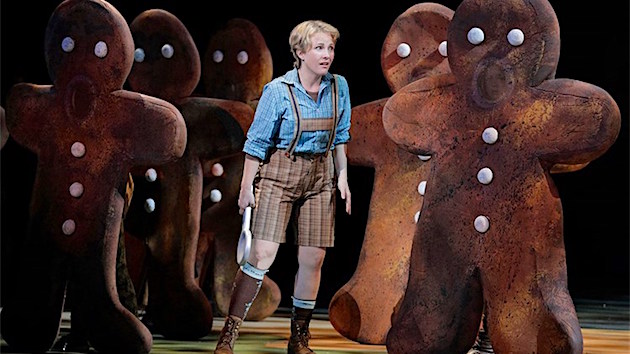
Contemporary music is intrinsic to her career, not at all a sideline. In addition to the Grammy for Doctor Atomic (2011), Cooke sang in this year’s Grammy winner for Best Opera Recording, Mason Bates’s The (R)evolution of Steve Jobs. In 2017, Cooke took on the psychologically demanding title role of Nico Muhly’s Marnie with English National Opera. Upcoming projects include a dramatic new song cycle, Intonations, by composer Jake Heggie and librettist Gene Scheer. Written as part of the Violins for Hope project, it uses violins played by victims of the holocaust that have been restored by the father-son luthiers Ammon and Avshalom Weinstein. The cycle will be performed at Kohl Mansion in Burlingame in 2020, continuing a connection with the Bay Area which began in the singer’s childhood, when she spent extended periods here, traveling from her home in Texas to visit her grandparents.
Cooke’s house debut at San Francisco Opera in 2012 was also in a contemporary piece, Mark Adamo’s The Gospel of Mary Magdalene. And Laura Kaminsky’s As One, in which two singers play different sides of one transgender person, was written for Cooke and her husband, baritone Kelly Markgraf. Perhaps such innovative and richly themed repertoire choices mark the influence of her college voice teacher at Rice University, Kathleen Kaun, with whom she is still close. Years ago, when Cooke told Kaun she wished she could sound like others, “perhaps maybe like a Queen of the Night,” Kaun replied, “no, it’s better to be unique.”
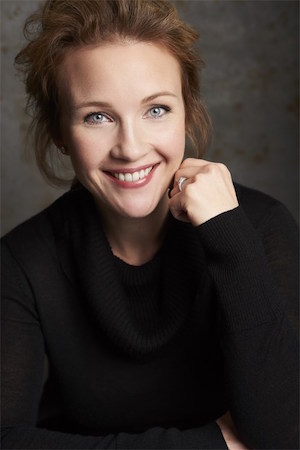
But different isn’t always easy. As a child, Cooke was badly teased in school because of her weight. Though Cooke has shed almost a hundred pounds since attending A&M Consolidated High School in College Station Texas, the pain of those memories lingers. “I think it shaped me,” says Cooke, who has been dieting since she was 8 years old. “I still struggle. I diet all the time. I’m doing a diet now,” she says. “I remember, they were throwing gum in my hair and calling me names on the bus, and I got off the bus and my mom said, ‘they’re just jealous,’ which was ridiculous. [Laughs.] I had friends, and a lot of love, but I did not have a positive experience.”
Cooke describes music as a safe haven. Though the demands on singers’ appearance in the age of HD are severe, Cooke seems to have taken the reins on this issue, embracing health and diet as challenges. “I became obsessed with exercise, with different nutritional stuff. I’ve always been interested in the new thinking about that.” That rigor is part of what supports her wellness on the road, where she makes a point of finding a good workout place, most often a yoga studio. She speaks of these early difficulties without resentment, and even a hint of gratitude. “Being sad made me a better singer,” she says, “because I had a kind of conversation with myself, apart from the world. It sounds like a Mahler quote.”
A lover of poetry, Cooke sometimes speaks of her repertory in poetic terms. “For the mezzo, there’s a lethargic, burdensome heaviness in her entrance,” she once said about Mahler’s Das Lied von der Erde. “And if you sing without this, then between the notes, it will not speak.” Another thing she contemplates about singing, somewhat paradoxically, is a lack of competition. “Only a woman can be a mezzo-soprano. I don’t have to compete with men at all, and [in] a lot of professions that’s not the case. You’re really an instrument. And there is an eternal feminine mysticism that will always interest artists, composers, and poets. The story of the female experience.”
Such thoughtful delving carries across the footlights, deepening the appreciation of critics and resulting in stellar reviews. For her performance as Kitty Oppenheimer at the Met, The New York Times’s Anthony Tommasini appreciated Cooke’s “aching, wistful intensity.” And for her rendering of Mary Magdalene, the San Francisco Chronicle’s Joshua Kosman called her performance one of “dazzling vocal majesty and theatrical clarity,” even aligning her voice with “the saintly nimbus that Renaissance painters suggested using gold paint.”
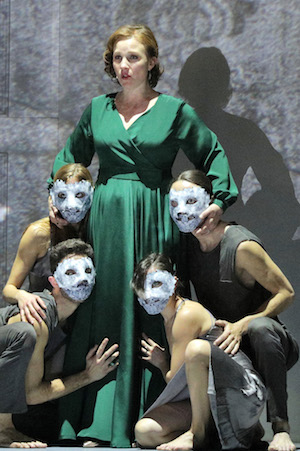
Early on, the agent Matthew Epstein advised her to “trust your gut.” It’s advice she follows to this day, allowing her to resist certain trends. Though she has a presence on social media, one would not go so far as to say there is a persona evident, the way some have created. The restraint is intentional. “This whole social-media culture is an interesting conversation and I have very mixed feelings about it. Everything is about creating a brand, and this idea that if you have followers it sells tickets. I don’t know if that’s true. What I see is that it puts ego front and center. I think it should be about the music. We’re just vehicles for it. The social-media machine puts the person first, and I think when you do that it’s over, the music is over.”
Another thing her gut has spoken up about is where to call home. Married 10 years, Markgraf and Cooke have two daughters — Evelyn, who just turned 8, and Julia, who is 2 ½. Not long ago, the family made a change, relocating from Chicago to the pastoral community of The Woodlands, Texas. “I worked with conductor Pinchas Steinberg,” Cooke explains, “who lives near Glyndebourne, and he talked about deer coming by his house, and a brook, and I thought, I need more nature! Not long after that, we moved. We found a place with 30 trees, a big lawn, a garden to put vegetables. We got a dog [a cocker spaniel], a hammock. Somewhere to feel your feet in grass.”
Cooke also wanted to be near family. Both parents are professors of Russian at Texas A&M University. “I heard Russian a lot growing up with my grandparents, and my parents spoke it sometimes. Now I give them a hard time about not teaching us. But at our Thanksgiving, all the professors from every different language department were around the table.” From the age of 10, Cooke was enamored of all things French, and a school trip to Paris at the age of 13 cemented the Texan’s love of travel. “On the bus ride between the airport and our hotel I think I went through a roll or two of film just taking pictures of doors and trees.
But a life on the road can be alienating, especially for a mother of young children. “As a mom, sometimes I feel out of the group,” she says. Sometimes little things make the difference. Locating the best coffee in town is a high priority. “It kind of gives me a bit of purpose on the road. If I’m in Amsterdam I ask the taxi driver where’s the best coffee, and I go, and start talking to the barista. One of the things you don’t have in this crazy lifestyle is patterns. It’s always new. Where is north, south, east, west? Where is my luggage? Where do I get dinner? The ritual of coffee is grounding.”
Despite her heavy schedule, Cooke has made time for teaching and enjoys giving master classes, in which she makes it a point to include discussion of the downsides of an operatic career. “The realities of being a singer, the less enjoyable aspects, the things you don’t know when you’re in school, and you don’t hear about.” For Cooke, the awareness of the challenges serves as a reminder that making music should be joyful. “If it doesn’t bring you joy,” she says, “it’s not worth all the sacrifice.”
High on Cooke’s list of joyful performances is singing Mahler at Carnegie Hall with the S.F. Symphony. Recalling the experience, Cooke describes an almost sublime level of acceptance and mutual appreciation. “I could feel every one of the players and Michael,” she says, “that love onstage, where they were with me and I was with them, and we were listening to each other in an open-hearted way. And when you feel that way— that you’re not auditioning, that you don’t have to prove yourself— when you can just be yourself, it changes how you sing.”

